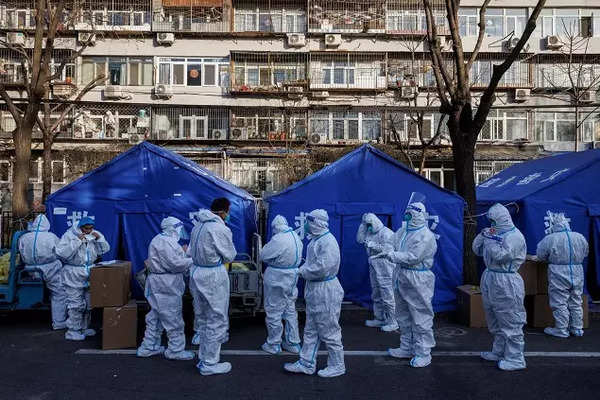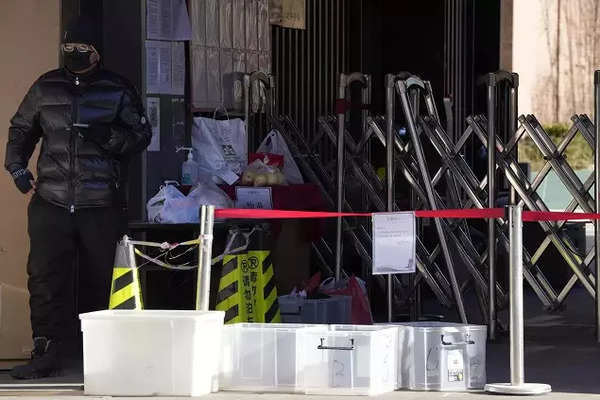After stating that the Omicron tension has eased and after unprecedented public outcry against a zero-Covid policy advocated by President Xi Jinping, China abruptly changed its Covid-handling protocols more than a week ago.
Moving away from endless testing, lockdowns and heavy travel restrictions, China is realigning itself with a world that has largely reopened to live with Covid.

Workers move coffins at a funeral complex in Beijing (AP photo)
China has told its 1.4 billion population to treat mild symptoms at home unless symptoms become severe, as cities across China brace for the first waves of infections.
In Beijing, which has yet to report any Covid deaths since policies changed on Dec. 7, ill workers have hit service personnel from restaurants and courier firms to its roughly a dozen funeral homes.
“Now we have fewer cars and workers,” a staff member at Miyun Funeral Home told Reuters, adding that there was a growing backlog in demand for cremation services.

Pandemic prevention workers gather before their shift to take care of buildings where residents carry out home quarantine (AP photo)
“We have many workers who have tested positive.”
It wasn’t immediately clear whether the struggle to meet the increased demand for cremation was due to a rise in Covid-related deaths.
At Huairou Funeral Home, a body had to wait three days before it could be cremated, a staff member said.
“You can carry the body here yourself, it has been busy recently,” the staffer said.
The last time the Chinese health authority reported deaths from Covid was on December 3. The Chinese capital last reported one death on Nov. 23.
Yet respected Chinese news outlet Caixin reported on Friday that two veteran state media reporters had died after contracting Covid-19 in Beijing, among the first known deaths since China rolled back most of its zero-Covid policies. . And on Saturday, Caixin reported that a 23-year-old medical student in Sichuan died of Covid on Dec. 14.
However, on Saturday the National Health Commission reported no changes to the official count of Covid deaths of 5,235.

A man walks past deliveries left outside a retirement home in Beijing (AP photo)
China’s abrupt lifting of its ultra-strict policies could cause more than a million deaths through 2023, according to the US-based Institute of Health Metrics and Evaluation (IHME).
Had those policies been rescinded earlier, say on January 3 this year, 250,000 people in China would have died, prominent Chinese epidemiologist Wu Zunyou said Saturday.
As of Dec. 5, the proportion of seriously or critically ill Covid patients had dropped to 0.18% of reported cases, Wu said, from 3.32% last year and 16.47% in 2020.
This shows that the death rate in China is gradually declining, he said, without elaborating.
It was unclear whether the seriously ill rate had changed since 5 December. Regular PCR testing and mandatory case reporting were abolished on 7 December.
“NORMAL DEAD”
“There are long queues of hearses here, and it’s hard to say when there will be places available,” said a staff member from Dongjiao Funeral Home.
“Normal deaths,” the staffer said, when asked if the deaths were related to Covid.
The lack of reported Covid deaths in the last 10 days has sparked the social media debate on data disclosure, also fueled by the lack of statistics on hospitalizations and the number of seriously ill patients.
“Why can’t these stats be found? What’s going on? Haven’t they counted them or are they just not announcing them?” she asked a netizen on Chinese social media.
China has stopped publishing asymptomatic cases since Wednesday, citing a lack of PCR testing among people without symptoms making it difficult to accurately calculate the total count.
Official figures have become an unreliable guide as fewer tests are performed across the country following the easing of zero-Covid policies.
In Shanghai, more than 1,000 km (620 miles) south of Beijing, local education authorities on Saturday told most schools to hold classes online starting Monday, to cope with worsening Covid infections across the China.
In a sign of incoming staff crunches, Shanghai Disney Resort said on Saturday that entertainment offerings could shrink to a smaller workforce, though the theme park was still operating normally.
